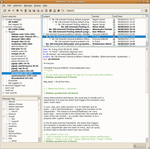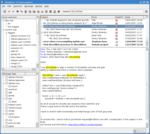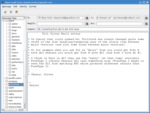What is it?
Manitou-Mail is an open source database-driven Mail User-Agent.
Its user interface differs from other mail programs in that it is
not an IMAP/POP3 client but rather a dedicated database application
connected to a PostgreSQL database server.
Key features are:
- Very fast retrieval. Direct SQL access to already-decoded data is much faster than the equivalent with IMAP. Stored user queries and full text search often yield instant results.
- No local storage or cache. Everything is stored inside the database, including filters and configuration information. Client installations are disposable.
- Robustness. Mailbox corruption and lost messages plague traditional mail programs. In Manitou-Mail, the data is kept safe from client-side crashes or bugs since all writing of the data is delegated to the PostgreSQL database server known for its robustness.
- Data openness. Querying the mail and associated data outside of the application is supported. The database schema is simple and documented, and the data is available in decoded form, including attachments.
- Customization. A unique feature of Manitou-Mail is that custom-made Perl functions can be plugged into the server-side mail workflow. See the documentation and the sample plugins.
How to use it?
1) Install manitou-mdx on a Unix/Linux host with the debian/ubuntu package or build it from the source tarball.
2) Choose a package for the user interface corresponding to your operating system(s): Windows, MacOS X, or Linux/Ubuntu. For other Unix systems, compile from source. Install it on the users computers (or the same machine than manitou-mdx for a single-machine Unix installation).
3) Point manitou-mdx to a spool of incoming mail and to a delivery agent for outgoing mail (see the documentation).
Help can be obtained through email





